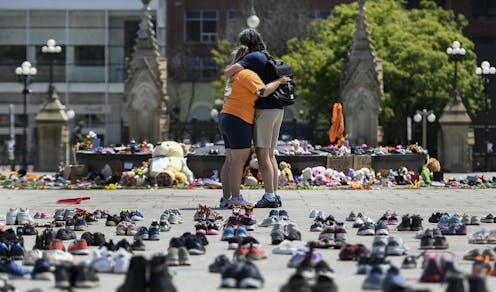
Warning: This article contains details that some readers may find distressing
It’s been a year since the unmarked graves of 215 Indigenous children — some of them as young as three years old — were found on the grounds of the former Kamloops Indian Residential School in British Columbia. Since then, hundreds more have also been found. Across Canada and the United States, communities reeled as more information was uncovered.
Many felt pain and outrage. Some also experienced relief that their family members who had disappeared from residential schools were finally found.
The Canadian government responded immediately making promises to address historical wrongs and commitments to reconciliation.
In the month following the findings, three of the Truth and Reconciliation Commission’s Calls to Action were completed: to establish a statutory holiday for Truth and Reconciliation; to put in place an Indigenous Languages Commissioner; to amend the Oath of Citizenship.
But one year later, advocates say these initial actions and promises were mostly symbolic. For example, the most recent provincial budget in B.C. “doesn’t have Kamloops high on its priority list.”
And the most recent announcement that Pope Francis will visit Canada this summer raises questions from communities about more empty gestures.
In today’s episode of Don’t Call Me Resilient, we’re taking a look back at what happened, the immediate political response, the widespread grief and outcry but also, how none of that lasted — despite communities continuing to find bodies.
An estimated 150,000 First Nation, Inuit, and Métis children attended residential schools — which were put in place by colonial governments — with the goal of exterminating Indigenous histories, cultures and languages.
The last residential school closed in 1997 in Rankin Inlet, Nunavut.
When the Truth and Reconciliation Commission released its final report in 2015, it provided a conservative estimate that between 4,000 and 6,000 children died while in attendance.
Are changes and conciliation on the horizon? Has the government kept its promise?
Our guest today is Veldon Coburn, assistant professor at the Institute of Indigenous Research and Studies at the University of Ottawa. Coburn is Anishinaabe from Pikwàkanagàn and authored The Conversation’s first article following the Kamloops findings. Joining Vinita and Veldon on the episode is Haley Lewis, Don’t Call Me Resilient producer and culture and society editor at The Conversation Canada. Lewis is mixed Kanyen'keha:ká from Tyendinaga and led our coverage of the findings last year.
Transcript
An unedited transcript of the episode is available here.
ICYMI — Articles published in The Conversation
No longer ‘the disappeared’: Mourning the 215 children found in graves at Kamloops Indian Residential School by Veldon Coburn
Podcast: Stolen identities: What does it mean to be Indigenous? Don’t Call Me Resilient EP 8 Interviewed: Veldon Coburn and Celeste Pedri-Spade
Canada’s hypocrisy: Recognizing genocide except its own against Indigenous Peoples
Why many Canadians don’t seem to care about the lasting effects of residential schools
When ‘good intentions’ don’t matter: The Indian Residential School system
Indian Residential Schools: Acts of genocide, deceit and control by church and state
Additional Reading + Listening
Capitalism and Dispossession by Veldon Coburn
It’s Time Settlers Own Up To Canada’s Mistreatment of Indigenous People in Refinery29 by Haley Lewis
Podcast: If Canada’s residential schools reckoning is real this time, what happens next? — The Big Story Podcast
Podcast: The Rot of Reconciliation in Canada — Media Indigena
Unmarked Graves: Yet another Legacy of Canada’s Residential School System
Slavoj Zizek: Will today’s chaos lead to change for the better? | The Stream
Support is available for anyone affected by their or their family’s experience at residential schools. Access to emotional and crisis referral services is available through the 24-hour national crisis line: 1-866-925-4419.
Follow and listen
You can listen or follow to Don’t Call Me Resilient on Apple Podcasts, Google Podcasts, Spotify or wherever you listen to your favourite podcasts. We’d love to hear from you, including any ideas for future episodes. Join The Conversation on Twitter, Facebook and Instagram and use #DontCallMeResilient.
Don’t Call Me Resilient is a production of The Conversation Canada. This podcast was produced with a grant for Journalism Innovation from the Social Sciences and Humanities Research Council of Canada. The series is produced and hosted by Vinita Srivastava. The producer on this episode is Haley Lewis. Our associate producer is: Vaishnavi Dandekar. Our sound producer is Lygia Navarro. Folarin Odunayo is a contributing producer. Reza Dahya is our sound designer. Jennifer Moroz is our consulting producer. Lisa Varano is our audience development editor and Scott White is the CEO of the Conversation Canada.
This article was originally published on The Conversation. Read the original article.







